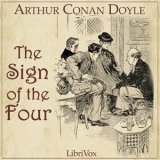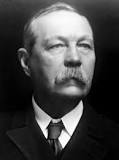The Sign of the Four Page #2
The Sign of the Four, also called The Sign of Four, is the second novel featuring Sherlock Holmes written by Sir Arthur Conan Doyle. Doyle wrote four novels and 56 short stories featuring the fictional detective.
"You have an extraordinary genius for minutiae," I remarked. "I appreciate their importance. Here is my monograph upon the tracing of footsteps, with some remarks upon the uses of plaster of Paris as a preserver of impresses. Here, too, is a curious little work upon the influence of a trade upon the form of the hand, with lithotypes of the hands of slaters, sailors, corkcutters, compositors, weavers, and diamond-polishers. That is a matter of great practical interest to the scientific detective,--especially in cases of unclaimed bodies, or in discovering the antecedents of criminals. But I weary you with my hobby." "Not at all," I answered, earnestly. "It is of the greatest interest to me, especially since I have had the opportunity of observing your practical application of it. But you spoke just now of observation and deduction. Surely the one to some extent implies the other." "Why, hardly," he answered, leaning back luxuriously in his arm-chair, and sending up thick blue wreaths from his pipe. "For example, observation shows me that you have been to the Wigmore Street Post-Office this morning, but deduction lets me know that when there you dispatched a telegram." "Right!" said I. "Right on both points! But I confess that I don't see how you arrived at it. It was a sudden impulse upon my part, and I have mentioned it to no one." "It is simplicity itself," he remarked, chuckling at my surprise,--"so absurdly simple that an explanation is superfluous; and yet it may serve to define the limits of observation and of deduction. Observation tells me that you have a little reddish mould adhering to your instep. Just opposite the Seymour Street Office they have taken up the pavement and thrown up some earth which lies in such a way that it is difficult to avoid treading in it in entering. The earth is of this peculiar reddish tint which is found, as far as I know, nowhere else in the neighborhood. So much is observation. The rest is deduction." "How, then, did you deduce the telegram?" "Why, of course I knew that you had not written a letter, since I sat opposite to you all morning. I see also in your open desk there that you have a sheet of stamps and a thick bundle of post-cards. What could you go into the post-office for, then, but to send a wire? Eliminate all other factors, and the one which remains must be the truth." "In this case it certainly is so," I replied, after a little thought. "The thing, however, is, as you say, of the simplest. Would you think me impertinent if I were to put your theories to a more severe test?" "On the contrary," he answered, "it would prevent me from taking a second dose of cocaine. I should be delighted to look into any problem which you might submit to me." "I have heard you say that it is difficult for a man to have any object in daily use without leaving the impress of his individuality upon it in such a way that a trained observer might read it. Now, I have here a watch which has recently come into my possession. Would you have the kindness to let me have an opinion upon the character or habits of the late owner?" I handed him over the watch with some slight feeling of amusement in my heart, for the test was, as I thought, an impossible one, and I intended it as a lesson against the somewhat dogmatic tone which he occasionally assumed. He balanced the watch in his hand, gazed hard at the dial, opened the back, and examined the works, first with his naked eyes and then with a powerful convex lens. I could hardly keep from smiling at his crestfallen face when he finally snapped the case to and handed it back. "There are hardly any data," he remarked. "The watch has been recently cleaned, which robs me of my most suggestive facts." "You are right," I answered. "It was cleaned before being sent to me." In my heart I accused my companion of putting forward a most lame and impotent excuse to cover his failure. What data could he expect from an uncleaned watch? "Though unsatisfactory, my research has not been entirely barren," he observed, staring up at the ceiling with dreamy, lack-lustre eyes. "Subject to your correction, I should judge that the watch belonged to your elder brother, who inherited it from your father." "That you gather, no doubt, from the H. W. upon the back?" "Quite so. The W. suggests your own name. The date of the watch is nearly fifty years back, and the initials are as old as the watch: so it was made for the last generation. Jewelry usually descends to the eldest son, and he is most likely to have the same name as the father. Your father has, if I remember right, been dead many years. It has, therefore, been in the hands of your eldest brother." "Right, so far," said I. "Anything else?" "He was a man of untidy habits,--very untidy and careless. He was left with good prospects, but he threw away his chances, lived for some time in poverty with occasional short intervals of prosperity, and finally, taking to drink, he died. That is all I can gather." I sprang from my chair and limped impatiently about the room with considerable bitterness in my heart. "This is unworthy of you, Holmes," I said. "I could not have believed that you would have descended to this. You have made inquires into the history of my unhappy brother, and you now pretend to deduce this knowledge in some fanciful way. You cannot expect me to believe that you have read all this from his old watch! It is unkind, and, to speak plainly, has a touch of charlatanism in it." "My dear doctor," said he, kindly, "pray accept my apologies. Viewing the matter as an abstract problem, I had forgotten how personal and painful a thing it might be to you. I assure you, however, that I never even knew that you had a brother until you handed me the watch." "Then how in the name of all that is wonderful did you get these facts? They are absolutely correct in every particular." "Ah, that is good luck. I could only say what was the balance of probability. I did not at all expect to be so accurate." "But it was not mere guess-work?" "No, no: I never guess. It is a shocking habit,--destructive to the logical faculty. What seems strange to you is only so because you do not follow my train of thought or observe the small facts upon which large inferences may depend. For example, I began by stating that your brother was careless. When you observe the lower part of that watch-case you notice that it is not only dinted in two places, but it is cut and marked all over from the habit of keeping other hard objects, such as coins or keys, in the same pocket. Surely it is no great feat to assume that a man who treats a fifty-guinea watch so cavalierly must be a careless man. Neither is it a very far-fetched inference that a man who inherits one article of such value is pretty well provided for in other respects."
Translation
Translate and read this book in other languages:
Select another language:
- - Select -
- 简体中文 (Chinese - Simplified)
- 繁體中文 (Chinese - Traditional)
- Español (Spanish)
- Esperanto (Esperanto)
- 日本語 (Japanese)
- Português (Portuguese)
- Deutsch (German)
- العربية (Arabic)
- Français (French)
- Русский (Russian)
- ಕನ್ನಡ (Kannada)
- 한국어 (Korean)
- עברית (Hebrew)
- Gaeilge (Irish)
- Українська (Ukrainian)
- اردو (Urdu)
- Magyar (Hungarian)
- मानक हिन्दी (Hindi)
- Indonesia (Indonesian)
- Italiano (Italian)
- தமிழ் (Tamil)
- Türkçe (Turkish)
- తెలుగు (Telugu)
- ภาษาไทย (Thai)
- Tiếng Việt (Vietnamese)
- Čeština (Czech)
- Polski (Polish)
- Bahasa Indonesia (Indonesian)
- Românește (Romanian)
- Nederlands (Dutch)
- Ελληνικά (Greek)
- Latinum (Latin)
- Svenska (Swedish)
- Dansk (Danish)
- Suomi (Finnish)
- فارسی (Persian)
- ייִדיש (Yiddish)
- հայերեն (Armenian)
- Norsk (Norwegian)
- English (English)
Citation
Use the citation below to add this book to your bibliography:
Style:MLAChicagoAPA
"The Sign of the Four Books." Literature.com. STANDS4 LLC, 2025. Web. 22 Feb. 2025. <https://www.literature.com/book/the_sign_of_the_four_100>.








Discuss this The Sign of the Four book with the community:
Report Comment
We're doing our best to make sure our content is useful, accurate and safe.
If by any chance you spot an inappropriate comment while navigating through our website please use this form to let us know, and we'll take care of it shortly.
Attachment
You need to be logged in to favorite.
Log In